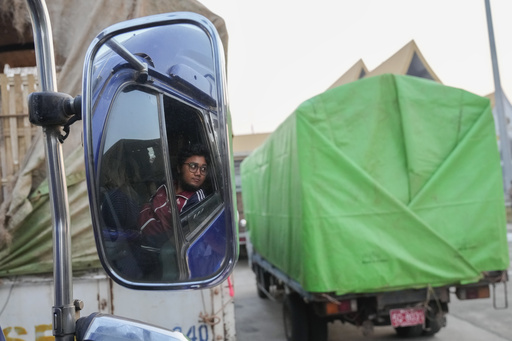MAE SOT, Thailand (AP) — Thailand delivered its first batch of humanitarian aid to war-torn Myanmar on Monday, in what officials hope will be a continuing effort to ease the plight of millions of people displaced by fighting.
But critics charge that the aid will benefit only people in areas under the Myanmar military’s control, providing it with a propaganda boost while leaving the vast majority of displaced people in contested areas without access to assistance.
Myanmar is wracked by a nationwide armed conflict that began after the army ousted the elected government of Aung San Suu Kyi in February 2021 and suppressed widespread nonviolent protests that sought a return to democratic rule. The fighting has displaced millions of people and battered the economy.
Thailand sent ten trucks over the border from the northern province of Tak, carrying some 4,000 packages of aid to three towns in Kayin State, also known as Karen State, where it will be distributed to approximately 20,000 displaced people.
The parcels contained aid worth around 5 million baht ($138,000), mostly food, instant beverages and other basic items such as toiletries.
More than 2.8 million people in Myanmar are displaced, according to U.N. agencies, most by fighting that arose after the army’s takeover. They say 18.6 million people, including 6 million children, require humanitarian aid.
Carl Skau, Chief Operating Officer of the U.N.’s World Food Programme, said earlier this month that one in four of the displaced is at risk of acute food insecurity.
The initiative for what has been called a humanitarian corridor is being carried out by the Thai Red Cross, with funding from Thailand’s Foreign Ministry and logistical support from the army, which traditionally has played a major role in border activities.
Officials from Thailand and Myanmar’s Kayin State attended a send-off ceremony, which was presided over by Thai Vice Foreign Minister Sihasak Phuangketkeow. Myanmar’s Red Cross will handle distribution of the aid.
Drivers from Myanmar took the trucks across the 2nd Thai-Myanmar Friendship Bridge, which crosses the Moei River on the border.
“That corridor puts humanitarian aid into the hands of the junta because it goes into the hands of the junta-controlled Myanmar Red Cross,” Tom Andrews, the U.N. independent human rights expert on Myanmar, said last week.
“So we know that the junta takes these resources, including humanitarian, and weaponizes them, uses them for their own military strategic advantage. The fact of the matter is, is that the reason that humanitarian aid is in such desperate need is precisely because of the junta.”
Andrews said the areas in desperate need are “conflict areas in which the junta has absolutely no influence or control whatsoever. So those are the areas we need to focus on.”
Large areas of the country, especially frontier areas, are now contested or controlled by anti-military resistance forces, including pro-democracy fighters allied with armed ethnic minority organizations that have been fighting for greater autonomy for decades.
Thai officials say the process of distribution will be monitored by the ASEAN Coordinating Centre for Humanitarian Assistance on Disaster Management to ensure it reaches people fairly and equally.
Vice Foreign Minister Sihasak said after the ceremony that the aid is expected to be delivered to the three towns the same day, and that Myanmar will send photos as proof it has been delivered.
“I would like to emphasize that this is truly humanitarian aid and not related to the politics or conflicts in Myanmar. I think, now, people should think about the interests of the Myanmar people as a priority,” he said. “Of course, if the initiative today is carried out smoothly, and meets the objectives that we set, Thailand as a neighbor will see how we can expand the help to other areas.”
The humanitarian corridor project was initiated by Thailand with support from Myanmar and other fellow members of the Association of Southeast Asian Nations during an ASEAN Foreign Ministers Retreat in Laos in January.
Thai Foreign Minister Parnpree Bahiddha-Nukara had said ASEAN needs to actively push to implement what it calls the Five-Points Consensus, which it agreed to just a few months after the army’s 2021 takeover.
The agreement called for an immediate end to violence, dialogue among all concerned parties, mediation by an ASEAN special envoy, provision of humanitarian aid through ASEAN channels, and a visit to Myanmar by the special envoy to meet all concerned parties.
But Myanmar’s generals, despite initially assenting to the consensus, failed to act on it, leaving ASEAN looking powerless.
Dulyapak Preecharush, a professor of Southeast Asia Studies at Bangkok’s Thammasat University, said the aid initiative is a good start for Thailand, which has been quiet and inactive” about Myanmar.
“The readiness of Thailand to deliver the aid is not an issue, but when the aid is delivered to Myanmar, it will face obstacles from violent fighting and different stakeholders who will have their gains and losses.”
Sihasak said Thailand hopes the aid will be distributed equally and transparently, and that the delivery of the aid will help create a “good atmosphere” that will contribute to the peace process in Myanmar.
Source: post





